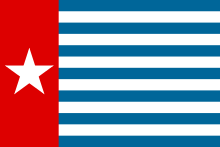Morning Star flag
 | |
| Name | The Morning Star flag |
|---|---|
| Adopted | 1 December 1961 |
| Designed by | Markus Wonggor Kaisiepo |
The Morning Star flag (Indonesian: Bintang Kejora) was a flag used in a supplemental fashion on Netherlands New Guinea (1949–1962) to the Flag of the Netherlands. It was first raised on 1 December 1961, and fell into disuse on 1 October 1962, when the territory came under administration of the United Nations Temporary Executive Authority (UNTEA).
The flag is used by the Free Papua Organization and other independence supporters.[1] Under Papua's Special Autonomy Law, ratified in 2002, the flag may be raised in Papua so long as the flag of Indonesia is also raised and it is higher than the Morning Star flag.[2] The flag consists of a red vertical band along the hoist side, with a white five-pointed star in the center, and thirteen horizontal stripes, alternating blue and white, with seven blue stripes and six white ones.
History
After territorial elections in January 1961 a New Guinea Council consisting of 28 members were sworn into office by Governor Dr. P.J.Platteel on 1 April 1961 and the Council's inaugurations on 5 April 1961 were attended by Australia, Britain, France, the Netherlands, New Zealand and other Pacific Forum nations with exception of the United States. The Council appointed a National Committee to draft a Manifesto expressing the desire for independence, and to design a flag and anthem commensurate with this desire. The design of the flag is credited to Markus Wonggor Kaisiepo. The full New Guinea Council endorsed these actions on 30 October 1961 and the first Morning Star flag was presented to Governor Platteel on 31 October 1961.
The Dutch authorities gave West Papua this flag to use as their National Flag as well as their National anthem and coat of arms. The official raising of the flag took place on 1 December 1961 on West Papua's Independence Day. Within a year, Indonesia invaded the Independent Nation of West Papua under Suharto[3] with National Committee Chairman Mr William Inury.[4]
Modern use
Markus Kaisiepo was a member of the Council, and after the transfer of sovereignty of West New Guinea to Indonesia, he remained in the Netherlands as an advocate of the Free Papua Movement, a peaceful organization demanding independence from Indonesia. To this day, the Morning Star is flown by advocates across the World, especially since the UK based Free West Papua Campaign was set up by exiled West Papuan Independence leader and former political prisoner in Indonesia, Benny Wenda. Special ceremonies take place on December 1 of each year, to commemorate the first flag raising in 1961. The flying of the Morning Star was a source of controversy over human rights abuses by Indonesian authorities.

Over 500,000 Papuans have been killed by the Indonesian Military (TNI) since 1961, some of them simply for raising the flag, which is illegal in Indonesia.[5] Two Papuan men, Filep Karma and Yusak Pakage, were sentenced to 15 and 10 year sentences for raising the flag in Jayapura in 2004.[6][7] Pakage was released in 2010, having served five years of his term.[8] Karma remains imprisoned and has alleged abuse at the hands of prison authorities.[7] Amnesty International considered both men prisoners of conscience and named Karma a 2011 "priority case."[9]
See also
Sources
- Peter D. King, West Papua & Indonesia Since Suharto: Independence, Autonomy, or Chaos (ISBN 0-86840-676-7), p. 31-32
- Richard Chauvel, Centre of Southeast Asian Studies Working Papers - Working Paper 121: Essays on West Papua, Vol. 2
- West Papua Information Kit - repository of reports and historical records
External links
References
- ↑ "Free West Papua Campaign Official website".
- ↑ Goldsmith, Ben; Brauer, Jurgen (2010). Economics of War and Peace: Economic, Legal, and Political Perspectives. Emerald Group Publishing. p. 101.
- ↑ http://wpik.org/Src/NYT/19611201.pdf New York Times
- ↑ Chauvel, Richard (2005). "Constructing Papuan Nationalism: History, Ethnicity, and Adaptation" (PDF). Managing Internal Conflicts in Asia. East–West Center. pp. 25–26.
- ↑ Cordell, Mani (30 November 2013). "West Papua Activist Says PNG Is Threatening Him with Arrest". The Guardian. Guardian Media Group.
- ↑ Richard Chauvel (6 April 2011). "Filep Karma and the fight for Papua's future". http://inside.org.au/. Retrieved 18 April 2011. External link in
|work=(help) - 1 2 Rebecca Henschke (3 August 2010). "Papua activist Filep Karma 'abused in prison'". BBC News. Retrieved 18 April 2011.
- ↑ "Indonesian Prisoner Yusak Pakage Released!". Amnesty International. 7 July 2010. Retrieved 19 April 2011.
- ↑ "Filep Karma, Jailed for Raising a Flag". Amnesty International. 2011. Retrieved 18 April 2011.